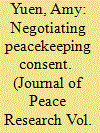| Srl | Item |
| 1 |
ID:
062358


|
|
|
| 2 |
ID:
173889


|
|
|
|
|
| Summary/Abstract |
The mixed record on civil war termination shows that it is a difficult task, one fraught with uncertainty and risk. Gaining consent for peacekeeping is one strategy policymakers and scholars forward to reduce these concerns. Formal and informal work argues that allowing peacekeeping serves as a costly signal of peaceful intentions; however, these models treat peacekeeping costs as exogenous. I argue that peacekeeping costs have an endogenous element and use consent for peacekeeping missions as a proxy measure. Three conclusions are evident. It is difficult to determine whether belligerents are insincere actors in a peace process or merely distrustful, but consent can tell us whether a ceasefire is precarious and therefore more likely to fail; peacekeeping is difficult but meaningful under some conditions, and reliable information can be taken from negotiating, not just war-fighting. These results qualify the extent to which peacekeeping, with its changing emphasis on consent, can improve its outcomes.
|
|
|
|
|
|
|
|
|
|
|
|
|
|
|
|
| 3 |
ID:
091614


|
|
|
|
|
| Publication |
2009.
|
| Summary/Abstract |
Why do targets sometimes make concessions when third parties offer assistance? Both the extended deterrence and alliance literatures point to unreliable third parties to explain deterrence failure and target acquiescence. On the other hand, the alliance literature also suggests that third parties present a moral-hazard situation in which targets will behave less prudently when they have outside support. Without dismissing the importance of these dynamics, I demonstrate that targets will still make concessions when intervention is certain, and that interveners do not always embolden targets in crisis situations. Counterintuitively, interveners alter the bargaining situation, shifting the bargaining space so that conceding is more attractive than war for the target state. Instead of emboldening targets, third parties deter larger demands and produce settlement outcomes that reduce the burden on the target.
|
|
|
|
|
|
|
|
|
|
|
|
|
|
|
|